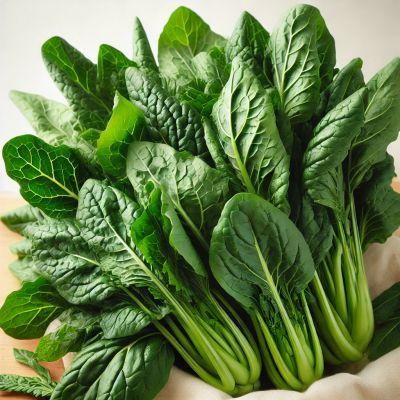
Vitamin and Mineral Profile of Chijimisai
Chijimisai, also known as Komatsuna, is a nutrient-rich leafy green vegetable that is popular in Japanese cuisine. Here is a general nutritional profile for Chijimisai per 100 grams (approximately 3 ounces):
- Calories: Approximately 20 kcal
- Carbohydrates: 3.1 grams
- Dietary Fiber: 1.8 grams
- Sugars: 0.4 grams
- Protein: 2.2 grams
- Fat: 0.3 grams
- Saturated Fat: 0.1 grams
- Monounsaturated Fat: 0.1 grams
- Polyunsaturated Fat: 0.1 grams
- Vitamins:
- Vitamin A: 6190 IU (124% of Daily Value)
- Vitamin C: 65 mg (108% of Daily Value)
- Vitamin K: 170 µg (213% of Daily Value)
- Folate: 80 µg (20% of Daily Value)
- Vitamin E: 0.85 mg (4% of Daily Value)
- Minerals:
- Calcium: 170 mg (17% of Daily Value)
- Iron: 2.8 mg (16% of Daily Value)
- Magnesium: 25 mg (6% of Daily Value)
- Potassium: 550 mg (16% of Daily Value)
- Phosphorus: 40 mg (4% of Daily Value)
- Sodium: 65 mg (3% of Daily Value)
- Zinc: 0.3 mg (2% of Daily Value)
- Manganese: 0.3 mg (15% of Daily Value)
Chijimisai is particularly noted for its high vitamin K content, which is important for blood clotting and bone health. It also provides a significant amount of vitamins A and C, which are essential for immune function, skin health, and antioxidant protection. Additionally, the high calcium content supports bone health.
Phytonutrients in Chijimisai
Chijimisai (Komatsuna) contains several phytonutrients that contribute to its health benefits. Here are some of the key phytonutrients found in Chijimisai:
- Glucosinolates: These compounds are known for their potential anti-cancer properties. When broken down, they form bioactive compounds such as isothiocyanates and indoles, which may help protect against certain types of cancer.
- Flavonoids: These antioxidants help reduce inflammation and oxidative stress in the body. They can contribute to cardiovascular health and may lower the risk of chronic diseases.
- Carotenoids: Including beta-carotene, lutein, and zeaxanthin, these compounds are important for eye health and may help reduce the risk of age-related macular degeneration and cataracts.
- Phenolic Acids: Such as caffeic acid and ferulic acid, these antioxidants can help protect cells from damage, reduce inflammation, and support overall health.
- Sulforaphane: This is a sulfur-containing compound with potential anti-cancer and detoxifying properties. It may help enhance the body's ability to eliminate toxins and protect against harmful environmental factors.
- Saponins: These compounds have been shown to have immune-boosting and cholesterol-lowering effects.
- Chlorophyll: The green pigment in Chijimisai is known for its potential to help detoxify the body, support liver function, and provide antioxidant benefits.
Including Chijimisai in your diet can contribute to overall health due to its rich array of phytonutrients, in addition to its vitamins and minerals. This nutritional profile makes Chijimisai an excellent addition to a balanced diet, contributing to various health benefits due to its rich nutrient composition.
Tip: Look for this wonderful green at your local farmer's market or Asian food store.
